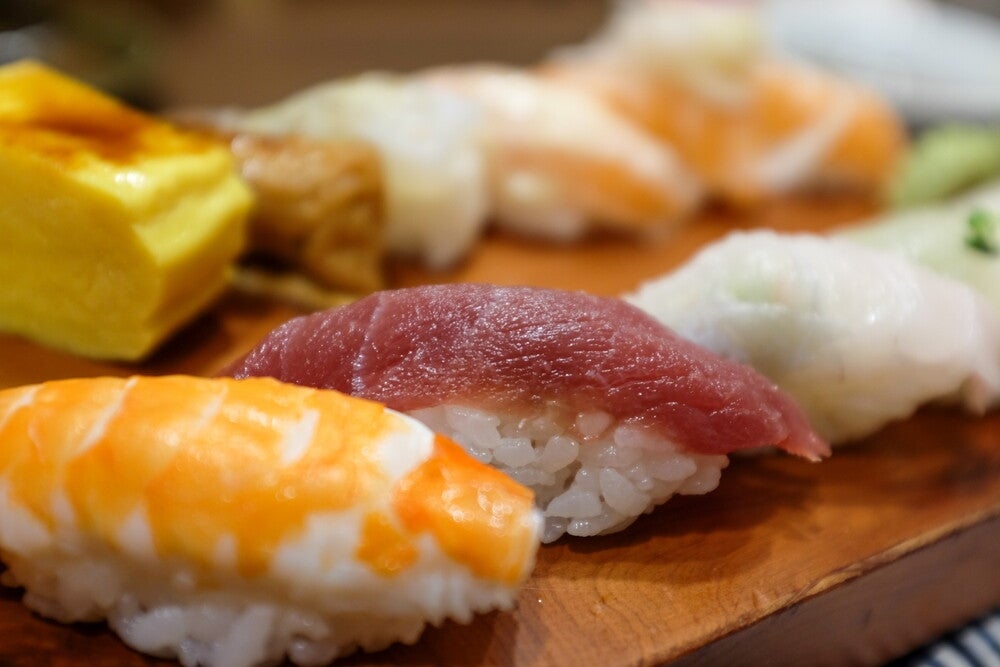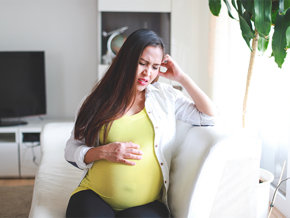
Pregnancy. Often, it gives expecting mothers an excuse to indulge a little. After all, you are eating for two—or more. But before you dive into that buffet, remember: nutrition is crucial for soon-to-be mothers. Your diet now impacts not just your health but your child’s. Read on for foods to avoid when pregnant, some just-as-delicious alternatives, and nutritional tips for safe eating during this period.
What to Avoid During Pregnancy

One simple rule when it comes to remembering what foods to avoid when pregnant: no raw proteins!
A general rule for foods to avoid during pregnancy is just to skip anything that poses a risk of infection, toxicity, or developmental harm to your baby. Try to avoid anything that’s considered unhealthy, like excessive sugar or salt.
1. Alcohol
Are you surprised? According to a study in Substance Abuse Treatment Prevention and Policy, alcohol consumption during pregnancy increases the risk of fetal developmental disorders, miscarriage or preterm labor, pregnancy and birth complications, and other potential health issues.
Safer choices: Water is your safest best. However, if you must give in to the occasional craving, choose non-alcoholic beverages like fresh-squeezed juice or sparkling water with a splash of juice. Be wary of your sugar intake, though. Consult your doctor if you have high glucose levels or gestational diabetes.
2. High-mercury fish
Swordfish (espada), king mackerel (tulingan), and tilefish (matang dagat) are also some of the foods not to eat when pregnant. High mercury fish may harm your baby’s developing nervous system. Moreover, a study in JAMA Network Open found that consuming too much mercury during pregnancy may affect a child’s metabolism later.
Safe choices: Opt for low-mercury fish like salmon, cod (bakalaw/gindara), shrimp, pollock, and catfish (hito).
3. Undercooked or raw meat and seafood
Pass on the raw fish and shellfish, including sushi, sashimi, and ceviche, due to the risk of bacterial or parasitic infections. Do you love your steak rare? Raw or undercooked meats can also harbor harmful bacteria like E. coli, Salmonella, and Toxoplasma.
Safe choices: You can still enjoy most seafood and meat dishes. However, make sure to cook them thoroughly. A properly cooked fish or cut of beef can taste just as delicious.
4. Raw eggs
That runny sunny-side-up egg in your tapsilog is tasty indeed. However, raw eggs can contain Salmonella, which can cause severe food poisoning that could affect your and your body. Also avoid food with raw eggs, such as homemade Caesar dressings, raw cookie dough, and certain sauces.
Safer choices: You can still enjoy eggs, of course. Just endeavor to cook the yolks and whites fully. Check commercial versions of your favorite dressings and egg-based sauces to see if they use pasteurized eggs, which are safe to eat, according to the U.S. Food & Drug Administration.
5. Processed meats
Other foods to avoid when pregnant include processed meats, like salami, hotdogs, bologna, longganisa, luncheon meat, and more. These items are prone to Listeria contamination. Listeria is a bacterium that can be harmful during pregnancy.
Safer choices: You can enjoy fresh meat that’s properly cooked. If you must eat deli meats, heat them until steaming hot to eliminate potential bacteria.
6. Unpasteurized dairy products, such as semi-hard and soft cheeses
Another type of food that’s prone to Listeria? Unpasteurized milk and cheeses like feta, Brie, and gorgonzola. If you see a cheese that’s mold-ripened with a white coating, avoid it.
Safer choices: Check if the dairy products you’re consuming are pasteurized. Most hard cheeses, like Grana Padano and Parmigiano Reggiano, are generally safe, but check the labels anyway.
7. Unwashed fruits and vegetables
Washing your food properly before cooking and eating is a good habit whether you’re pregnant or not. Consuming unwashed produce can expose you to harmful bacteria and parasites.
Safer choices: Wash all fruits and vegetables carefully under running water before eating.
8. Raw sprouts
Raw sprouts, like alfalfa, clover, and radish, can be dangerous because they have a high risk of bacterial contamination, including Salmonella, E. coli, and Listeria. These bacteria can thrive in the warm, humid conditions—like the Philippines—needed for sprout growth and are difficult to wash away.
Safer choices: It’s best to avoid raw sprouts and enjoy them only when cooked fully.
When in doubt, choose fresh, well-cooked, and pasteurized foods. Consult your doctor for personalized recommendations or rules, especially if you’re taking medication or have a specific condition.
When in doubt, choose fresh, well-cooked, and pasteurized foods. Consult your doctor for personalized recommendations or rules, especially if you’re taking medication or have a specific condition.
Fruits to Avoid When Pregnant
Not all fruits are equal when it comes to prenatal benefits. While enjoying properly washed and prepared fruit is generally okay, excessive consumption of certain fruits could lead to complications.
For example, a study in the British Journal of Nutrition reveals that high concentrations of latex in unripe or semi-ripe papaya can induce contractions. Pineapple, on the other hand, contains bromelain, which research says could trigger contractions. More studies are needed to confirm this effect, but err on the safe side and avoid excessive amounts.
What Will Happen If You Eat Unsafe Food While You’re Pregnant?

Raw fish and meat could make you more prone to food-borne illnesses.
Pregnant women are more susceptible to food-borne illnesses due to changes in the immune system. Some bacteria and parasites can lead to serious complications, including miscarriage, stillbirth, or illness in your newborn. Here are some of the issues you may encounter if you consume foods to avoid when pregnant.
Listeria
Listeria is one of those sneaky bacteria that can be especially dangerous during pregnancy. It’s especially risky in deli meats, soft cheeses made with unpasteurized milk, smoked seafood, and unpasteurized dairy. What makes it extra tricky is that it can grow even in the fridge. Pregnant women are more vulnerable to listeriosis, which could potentially lead to miscarriage, preterm labor, or serious newborn infections. Common Listeria symptoms include a flu-like manifestation, nausea, vomiting, fatigue, and weakness.
The good news? It’s easy to avoid. Stick to pasteurized dairy, heat deli meats until steaming, and skip the cold smoked salmon unless it’s cooked.
Salmonella
Nobody wants food poisoning, but Salmonella can be a bigger pain during pregnancy. Fever, vomiting, and dehydration are much harder when you’re expecting. In rare, severe cases, it can lead to preterm labor or serious infections in your baby. Salmonella lurks around in raw or undercooked eggs, poultry, and unpasteurized dairy. Cook your eggs till firm, and confirm if your chicken is ready by checking that the meat is opaque and the juices run clear.
Toxoplasma
Toxoplasma is a parasite that causes toxoplasmosis. This condition is usually mild in adults. You might even mistake Toxoplasma symptoms for the flu. However, it can be dangerous for an unborn baby, potentially leading to birth defects, brain development issues, or vision problems. It’s commonly found in undercooked meat, unwashed fruits and vegetables, and cat feces. The good news is that simple precautions go a long way—wash produce thoroughly, cook meat completely, and if you have a cat, ask someone else to clean the litter box properly.
E. coli
E. coli is another stomach-turning bacteria that can cause serious digestive issues, dehydration, and, in extreme cases, kidney problems. For pregnant women, the risk isn’t just feeling miserable. It may also cause complications for the baby. E. coli is often in undercooked ground beef, unpasteurized milk and juices, and contaminated produce. To be safe, cook burgers all the way through, choose pasteurized dairy, and give those fruits and veggies a good rinse before eating.
How Can I Reduce My Risk of Food-Borne Illness During Pregnancy?
Apart from knowing what to avoid during pregnancy, practicing general food safety guidelines can help protect you and your baby from food-borne illnesses. Here are some essential tips to keep in mind.
1. Wash your hands and utensils frequently.
Whether it’s you, your partner, or someone else, remind whoever’s cooking at home to wash their hands with soap and water before and after handling food. Clean all cutting boards, knives, and utensils, especially if they've been exposed to raw meat, seafood, or eggs.
2. Cook food to safe temperatures.
Take a break from runny eggs, sushi, and kinilaw, and avoid pink in your meats. If you’re unsure, use a food thermometer to guarantee that meat is cooked thoroughly:
- Poultry: 74°C
- Ground meats: 71°C
- Whole cuts of meat: 63°C
- Fish: 63°C or until flaky and opaque
3. Don’t forget about proper food storage.
Clean any areas where you keep food, from containers to the cupboards to the refrigerator. Store raw meats separately from ready-to-eat foods to prevent cross-contamination, and keep your refrigerator temperature at least 4°C and your freezer at -18°C.
Refrigerate leftovers within two hours and consume them within three to four days. Always reheat them properly before eating.
4. Wash fruits and vegetables thoroughly.
Rinse all fresh produce under running water, even if you plan to peel it. Use a produce brush to clean firm fruits and vegetables like melons.
5. Limit your caffeine intake and avoid alcohol altogether.
Keep your caffeine consumption under 200 mg daily or about one small cup. No amount of alcohol is safe during pregnancy. Don't fret. These lifestyle changes are small and temporary. Plus, you can choose mocktails, herbal teas, or flavored sparkling water as an alternative. Better yet, drink plenty of good, old water (aim for 8 to 12 cups per day) to stay hydrated. You can also drink some milk. Calcium is good for pregnant women.
Being an expecting mother isn’t always a walk in the park, but now that you know what foods to avoid when pregnant, you can make the most of what you can enjoy, starting with these safe meal plan recommendations. Protect your health and give your baby a terrific start in life with smarter food choices.
References
Addila, Alemu Earsido, Telake Azale, Yigzaw Kebede Gete, and Mezgebu Yitayal. “The Effects of Maternal Alcohol Consumption During Pregnancy on Adverse Fetal Outcomes Among Pregnant Women Attending Antenatal Care at Public Health Facilities in Gondar Town, Northwest Ethiopia: A Prospective Cohort Study.” Substance Abuse Treatment Prevention and Policy 16, no. 1 (August 26, 2021). https://doi.org/10.1186/s13011-021-00401-x.
A. Adebiyi, None Ganesan Adaikan P, and R.N.V. Prasad, “Papaya (Carica Papaya) Consumption Is Unsafe in Pregnancy: Fact or Fable? Scientific Evaluation of a Common Belief in Some Parts of Asia Using a Rat Model,” British Journal of Nutrition 88, no. 2 (August 1, 2002): 199–203, https://doi.org/10.1079/bjnbjn2002598.
Gomez, Katalin Ujhelyi, Laura Goodwin, Anna Chisholm, and Abigail K. Rose. “Alcohol Use During Pregnancy and Motherhood: Attitudes and Experiences of Pregnant Women, Mothers, and Healthcare Professionals.” PLoS ONE 17, no. 12 (December 1, 2022): e0275609. https://doi.org/10.1371/journal.pone.0275609.
Human Foods Program, “Dairy and Eggs (Food Safety for Moms-to-Be),” U.S. Food And Drug Administration, September 27, 2018, https://www.fda.gov/food/people-risk-foodborne-illness/dairy-and-eggs-food-safety-moms-be.
Human Foods Program, “Meat, Poultry & Seafood (Food Safety for Moms-to-Be),” U.S. Food And Drug Administration, September 27, 2018, https://www.fda.gov/food/people-risk-foodborne-illness/meat-poultry-seafood-food-safety-moms-be.
Food Safety. “Safer Food Choices for Pregnant Women,” January 31, 2025. https://www.cdc.gov/food-safety/foods/pregnant-women.html.
Stratakis, Nikos, David V. Conti, Eva Borras, Eduardo Sabido, Theano Roumeliotaki, Eleni Papadopoulou, Lydiane Agier, et al. “Association of Fish Consumption and Mercury Exposure during Pregnancy with Metabolic Health and Inflammatory Biomarkers in Children.” JAMA Network Open 3, no. 3 (March 16, 2020). https://doi.org/10.1001/jamanetworkopen.2020.1007.




























